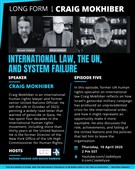[The following report was issued by International Crisis Group on 19 October 2012.]
The North Caucasus: The Challenges of Integration (II), Islam, the Insurgency and Counter-Insurgency
Executive Summary
Armed conflict in the North Caucasus is the most violent in Europe today. Insurgents seeking a regional political unit founded on Sharia (Islamic law) attack Russian officials and security forces, whose main response until recently has been a tough focus on eradicating the insurgency with a massive security presence, leaving little room for dialogue. While this policy has had successes, some 574 insurgents, security forces and civilians have died through September 2012, and there are almost daily attacks in the region and, occasionally, as far afield as Moscow. A dialogue with moderate Salafis and efforts to reintegrate insurgents who surrender has started, especially in Dagestan, but is challenged by opponents of soft power measures among security services and the insurgency. The root causes of violence are as much about ethnicity, state capacity and the region’s poor integration into Russia as about religion. To succeed in conflict resolution, Russia needs to design and implement a long-term comprehensive approach joining ethnic policies, intra-confessional dialogue, institution building, and reintegration of ex-fighters.
Fundamentalist Islam, in particular Salafism, has been growing in the region since the end of the Soviet Union. The manner in which it has evolved in the several republics has depended largely on how the government and its security forces have treated conservative Muslim communities, the historical role of religion and ethnicity, ties to the Chechnya conflict and local religious leaders’ teachings. Islamisation tends to be more prominent in the east, but Salafi communities are also growing in the west. In the east, an acute conflict with followers of a more traditional form of Islam, mainly Sufis, with whom the state tends to side, contributes to Salafi radicalisation. Most Salafis remain peaceful but have difficulties integrating into the local social space and economy. An effort to reduce the sectarian schism by civilian dialogue and increased cooperation between religious groups has been underway in Dagestan since spring 2011, but this was seriously undermined in August 2012, when the most influential Sufi sheikh in the North Caucasus was killed by a suicide bomber.
The insurgency behind most of the armed clashes and the terrorism that haunts local communities declared itself a unified force, with its own cause, modes of operation and communication, funding sources, leadership and cadre, in 2007 when it created a regional Caucasus Emirate to bring disparate groups under a central command. Much of the original leadership has been killed by security forces and replaced with a much younger, less experienced and unified cadre. The insurgency is less able to carry out large, spectacular acts of terror or engage in lengthy battles with Russian military forces, but it has not given up the tactic of terror attacks in other parts of Russia, especially on transport lines and hubs, such as Domodedovo Airport (2011) and the Moscow Metro (2010). The vast majority of its attacks in the North Caucasus are now against security services, local officials, and traditional clergy and involve improvised explosive devices (IEDs), shootings, and, at times, suicide bombers.
The government’s counter-terrorism policy has mainly been led by the interior ministry and the Federal Security Service (FSB) and focused on law enforcement. Commanders have significant room for manoeuvre, including establishment of zones for operations that can last several months and cover extensive territory in which many constitutional rights and liberties are suspended. Until recently suspected insurgents were most often killed in special operations or detained. Torture is applied widely for investigative or intelligence purposes; enforced disappearances target not only alleged insurgents, but also those believed to be aiding them or prominent Islamists; retributive punishment is applied to family members in some republics. These harsh measures do little to convince radicalised parts of the population to give their allegiance to the Russian state. They seem instead to stimulate a new generation of disillusioned youth to “join the forest” (go over to the insurgency) in search of revenge or a different political order.
Many in the Russian government have come increasingly to understand the limitations of a counter-insurgency that employs only hard security measures and does very little to win the hearts and minds of local communities. Local authorities in Dagestan have been testing a novel approach that includes dialogue with and more tolerance of moderate Salafis and negotiations to encourage insurgents to lay down their weapons and reintegrate into peaceful life. A similar approach in Ingushetia has significantly improved the situation since 2009. Chechen officials also go beyond hard security measures but apply a very different approach, seeking to promote a Sufi Islam while eradicating Salafi ideology and applying very tough measures to suspected fighters and often their supporters.
This second report of Crisis Group’s new North Caucasus Project analyses the Islamic factor in detail: the growth of fundamentalist Islam; radicalisation of parts of the community; the insurgency; and the state’s approaches to counter-insurgency. It should be read in conjunction with the first report, published simultaneously, that outlines the region’s ethnic and national groups, their grievances and disputes, including a more extensive discussion of the Chechen conflict. A subsequent report will further elaborate the government’s regional policies, governance and the local economy and offer specific policy recommendations relevant to all aspects of the three-part series.
[Click here to download the full report.]
![[ICG logo. Image from crisisgroup.org]](https://kms.jadaliyya.com/Images/357x383xo/ICGlogoweb.jpg)
















